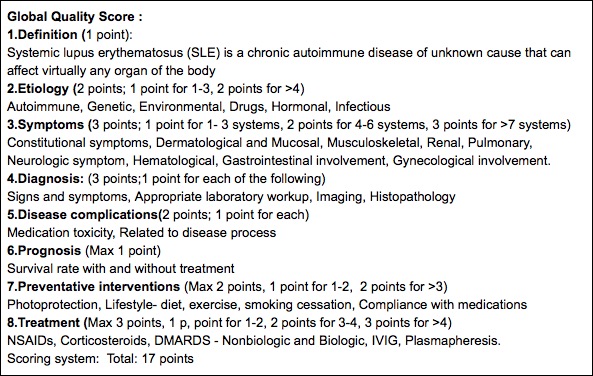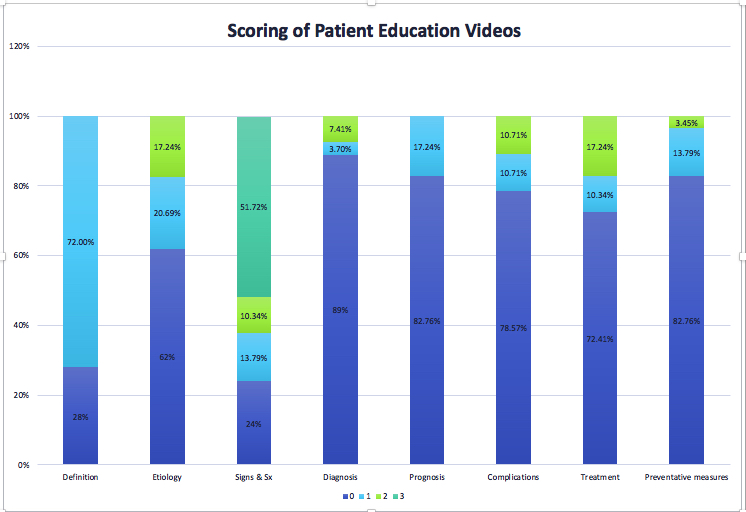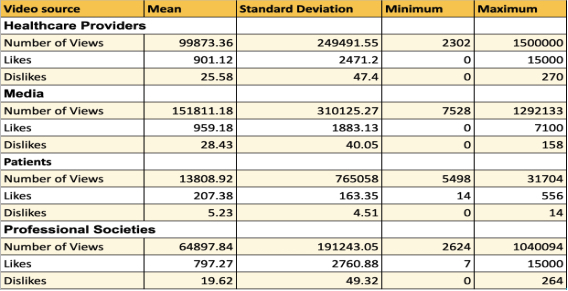Session Information
Date: Sunday, November 8, 2020
Title: Patient Outcomes, Preferences, & Attitudes Poster II: Miscellaneous Rheumatic Diseases
Session Type: Poster Session C
Session Time: 9:00AM-11:00AM
Background/Purpose: A large global survey released by the World Lupus Federation showed that the awareness of SLE is low and many individuals have never heard of the disease. Amongst the patients diagnosed with SLE, most of the patients were noted to have poor insight. Therefore, it is essential to have good patient education in order to improve the overall outcomes. Most of the patients with SLE are young and are known to use the internet as a source of information to learn about their disease. As of May 2020, YouTube is the most popular website with monthly traffic of 1.62 billion in the world. YouTube being the most popular website, we have analyzed the source, content, quality, and association between several variables of the videos.
Methods: We searched YouTube using the keywords Systemic Lupus Erythematosus. The resulting search feed of the top 100 videos was arranged in descending order of the number of views which was then analyzed. We included videos that are less than 30 minutes in length and only in the English language. These following variables and their combinations thereof were analyzed:-
- Content of the video: Patient experience, Advertisement, Patient education, and Medical professional education
- Source of the video: Professional Societies, Health care providers, Patients, and Media
- Duration
- The number of views likes and dislikes
- Quality of patient education videos
The quality of these videos was rated using a Global Quality Score system( figure 1) which is derived from the following- definition, etiology, signs and symptoms, diagnosis, prognosis, complications, and treatment measures. This scoring system has a minimum of 0 points and a maximum of 17 points. This statistical data were analyzed using the SAS system.
Results: The top 100 viewed videos were classified based on the content of the video. Medical professional education contributed to 46 videos( 46%), whereas 29 videos (29%) were related to patient education and 20 videos (20%) were based on personal experience and 5% on advertisements. Of the 29 patient education videos analyzed 22 videos defined Systemic Lupus Erythematosus,11 videos out of 29 discussed etiology, 4 videos of 29 discussed the signs and symptoms, 5 videos of 29 discussed prognosis, 6 videos of 29 discussed the complications of the disease, 8 videos of 29 discussed treatment modalities and 3 videos of 29 discussed preventative measures. The results of the Global Scoring System is further analyzed in Figure 2. Further analysis regarding the association of the video source and Number of views, likes, and dislikes was made. Of all the video sources, media (tv shows, news, social media received the most number of views, likes, and dislikes. (Figure 3)
Conclusion: Based on the information obtained, these videos are very popular but a poor source of educating people regarding the disease. There is a clear need to increase the understanding and awareness of systemic lupus erythematosus and highlight the prognosis, treatment options, and preventative measures. Healthcare providers should emphasize the impact lupus has on people living with lupus and provide more insight into the disease and spread education materials and videos. We should also advise the patients to obtain information from reputed sources.
 Figure 1: Global Scoring System
Figure 1: Global Scoring System
 Figure 2: Scoring of Patient Education Videos
Figure 2: Scoring of Patient Education Videos
 Figure 3: Video source and number of views, likes, and dislikes.
Figure 3: Video source and number of views, likes, and dislikes.
To cite this abstract in AMA style:
Garlapati P, Uppal J, Umer S, Hayat S. The Influence of YouTube on Spreading Awareness and Patient Education Regarding Systemic Lupus Erythematosus [abstract]. Arthritis Rheumatol. 2020; 72 (suppl 10). https://acrabstracts.org/abstract/the-influence-of-youtube-on-spreading-awareness-and-patient-education-regarding-systemic-lupus-erythematosus/. Accessed .« Back to ACR Convergence 2020
ACR Meeting Abstracts - https://acrabstracts.org/abstract/the-influence-of-youtube-on-spreading-awareness-and-patient-education-regarding-systemic-lupus-erythematosus/
